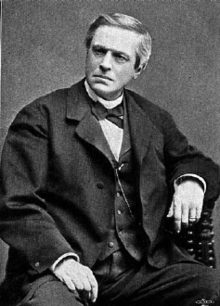Sven Lovén
Sven Ludvig Lovén (born January 6, 1809 in Stockholm ; † September 3, 1895 on Gut Karlsborg near Haga near Stockholm) was a Swedish naturalist and choirmaster .
Life
family
Sven Lovén was the son of the merchant, military man and member of the Reichstag Christian Lovén (1765-1854). He was married to Sigrid Mathilda Ekström from 1841 and had with her the son Sigurd Lovén (1849–1888), who became a doctor. His cousins included the physician Nils Henrik Lovén (1801–1877) and the ethnologist and priest Nils Lovén (1796–1858).
As a researcher
Lovén studied in Uppsala and received his exam there. In 1829 he rose to a master's degree and the following year he was appointed lecturer in zoology at Lund University . His main interest at the time was in vertebrates , especially birds. His work Om fåglarnes geografiska utbredning (On the geographic distribution of birds) testifies to this .
In the years 1830/31 Lovén made a trip to Berlin where he studied the organizational behavior of animals in more detail. During this stay he followed the suggestion of his teachers, Christian Gottfried Ehrenberg and Karl Asmund Rudolphi , and devoted himself increasingly to the study of marine invertebrates .
The specialization in this area enabled Lovén to undertake a number of research trips. One of his first scientific excursions took him to the west coast of Sweden. Furthermore, in 1836/37 a trip to the northern Norwegian province of Finnmark and to Spitzbergen followed . This trip is considered to be the first Swedish scientific excursion to the named areas. In doing so, he prepared the ground for the following more well-known expeditions by, for example, Otto Torell , Adolf Erik Nordenskiöld and Alfred Gabriel Nathorst . On Svalbard, Lovén recognized similarities between the Arctic fauna and the fauna of Scandinavia during the last Ice Age .
Lovén's early scientific treatises include two articles on “Swedish Trilobites ” (1844 and 1845) and a work on the systematics of Scandinavian molluscs , Index molluscorum (1846). He became internationally known for his work on the embryonic development of molluscs, especially on the free-swimming trochophoric larvae . As early as 1835, Lovén had discovered a previously unknown type of cancer , which he named Evadne Nordmanni . Lovén was elected to the Swedish Academy of Sciences in 1840 and was appointed professor the following year. In 1841 he became head of the mollusc department in the Natural History Museum in Stockholm. He held this post until 1892. In 1859 he was elected a member of the German Academy of Sciences Leopoldina . In 1860 he was admitted as a corresponding member of the Russian Academy of Sciences in Saint Petersburg , in 1871 as an external member of the Bavarian Academy of Sciences , in 1872 as a corresponding member of the Académie des Sciences and in 1875 of the Prussian Academy of Sciences . In 1881 he was elected to the Royal Society of Edinburgh , 1885 to the Royal Society , 1886 to the Göttingen Academy of Sciences and 1895 to the American Academy of Arts and Sciences .
From 1870 to 1892, Lovén turned his scientific attention to echinoderms , mainly sea urchins . To this end, he established a marine research station in the fishing village of Kristineberg in Bohuslän , which is now part of the Sven Lovén Center for Marine Sciences at the University of Gothenburg. Etudes sur les echinoidées (1874) and On Pourtalesia, a genus of Echinoidea (1883) can be mentioned among the scientific works that were produced during this period .
As a choir director
During the time that Lovén spent in Lund , he dealt with scientific research and music, especially vocal music . In 1829/30 he led a quartet that practiced in his laboratory. During Lovén's study trip to Berlin, a new student association was founded in Lund, which he was able to win as a choir director on his return. On November 20, 1831, the choir, later named Lunds Studentsångförening (Lunds Studentensingverein), gave its first concert. The members of the first hour included z. B. the composer Otto Lindblad , who was also Lovén's successor as choir director.
Lovén was elected to the Royal Swedish Academy of Music in 1868.
literature
- Sven Lovén . In: Herman Hofberg, Frithiof Heurlin, Viktor Millqvist, Olof Rubenson (eds.): Svenskt biografiskt handlexikon . 2nd Edition. tape 2 : L – Z, including supplement . Albert Bonniers Verlag, Stockholm 1906, p. 92 (Swedish, runeberg.org ).
- Sven Ludvig Lovén . In: Theodor Westrin (Ed.): Nordisk familjebok konversationslexikon och realencyklopedi . 2nd Edition. tape 16 : Lee – Luvua . Nordisk familjeboks förlag, Stockholm 1912, Sp. 1181-1183 (Swedish, runeberg.org ).
Individual evidence
- ↑ Member entry of Sven Ludwig Lovén at the German Academy of Natural Scientists Leopoldina , accessed on November 25, 2015.
- ↑ Holger Krahnke: The members of the Academy of Sciences in Göttingen 1751-2001 (= Treatises of the Academy of Sciences in Göttingen, Philological-Historical Class. Volume 3, Vol. 246 = Treatises of the Academy of Sciences in Göttingen, Mathematical-Physical Class. Episode 3, vol. 50). Vandenhoeck & Ruprecht, Göttingen 2001, ISBN 3-525-82516-1 , p. 155.
- ↑ Gamla Lund Förening för Bevarande av stadens minnen, årsskrift , 63, 1981, pp. 17-30
| personal data | |
|---|---|
| SURNAME | Lovén, Sven |
| ALTERNATIVE NAMES | Lovén, Sven Ludvig |
| BRIEF DESCRIPTION | Swedish naturalist and choir director |
| DATE OF BIRTH | January 6, 1809 |
| PLACE OF BIRTH | Stockholm |
| DATE OF DEATH | September 3, 1895 |
| Place of death | Gut Karlsborg near Haga near Stockholm |
